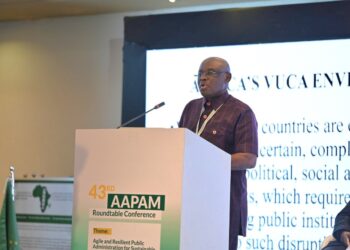The police have announced that the planned anti-corruption march to parliament has not been cleared, therefore it’s illegal and warned organisers not to dare hold it.
The march in question is to take place on the 23rd of this month and, is intended to highlight and protest against widespread corruption allegations and is expected to attract thousands of participants.
However, Police have issued a stern warning against what they termed an “illegal” and potentially disruptive protest planned to converge at Parliament. While addressing journalists on Monday at Police headquarters-Naguru, the force’s spokesperson Kituuma Rusoke alluded that the Police have not cleared them because the organizers have not informed the Police for protection.
“We are informed of an ongoing mobilization calling for people to march to parliament but we want to warn organisers that given the lack of transparency and a potential of disorder, we are against this march,” Rusoke asserted, his tone firm and unwavering.
Speaking further on the matter, Rusoke emphasized the lack of official notification to security agencies regarding the purported protest, hinting at potential chaos on Kampala’s already congested roads.
“As security agencies, we have not been informed of the said planned protest that he warned is likely to escalate into disorder on Kampala roads,” he remarked, raising eyebrows among concerned citizens.
Rusoke continued to express grave concerns about clandestine mobilization efforts, suggesting dire consequences if the protest were to proceed unchecked.
“By mobilizing behind the scenes, this said protest is likely to be disastrous and as security, we will not allow it to continue,” Rusoke cautioned in his words carrying the weight of official authority.
Despite acknowledging constitutional rights to peaceful demonstration and assembly, Rusoke underscored suspicions of malicious intent behind the organizers’ actions.
“We have seen organizers using social media to mobilise people to parliament. We respect the constitutional right to carry out a peaceful demonstration and right to assembly but we know some people with ulterior motives might want to hijack these activities,” Rusoke said, referencing intelligence reports pointing to potential disruptions.
In a bid to steer the situation towards calm, Rusoke urged organizers to engage with police for proper guidance on conducting peaceful dissent.
What does the law say?
Uganda is a State Party to the 1966 International Covenant on Civil and Political Rights (ICCPR). Article 21 governs the right of peaceful assembly, providing that:
The right of peaceful assembly shall be recognized. No restrictions may be placed on the exercise of this right other than those imposed in conformity with the law and which are necessary in a democratic society in the interests of national security or public safety, public order (ordre public), the protection of public health or morals or the protection of the rights and freedoms of others.
Under the 1995 Constitution of Uganda, every person has the freedom to assemble and to demonstrate together with others peacefully and unarmed and to petition the government.
The 2013 Public Order Management Act is the primary legislation governing assemblies in Uganda. There is a notification regime under the Act, but which functions de facto as a request for authorisation. Notification must be made at least three days in advance under Section 5 of the Act.
Section 6(1) permits the government to refuse permission to hold a proposed public meeting because “notice of another public meeting on the date, at the time and at the venue proposed has already been received by the authorized officer; or the venue is considered unsuitable for purposes of crowd and traffic control or will interfere with other lawful business.”
Section 8 authorises the police “to stop or prevent the holding of a public meeting where the public meeting is held contrary to the Act”, and to order the dispersal of a public meeting where “reasonable in the circumstances”.
Section 10 requires organisers to provide sufficient stewards for an assembly and ensure that it is concluded peacefully before 7 pm. Participants are required not to obstruct traffic and avoid disorder. Failure to comply with these requirements can result in criminal prosecution and liability.
Although, in this law, some closures were quashed by the Constitutional Court, Police have continually used the old law to apprehend anyone violating it.
Do you have a story in your community or an opinion to share with us: Email us at editorial@watchdoguganda.com













